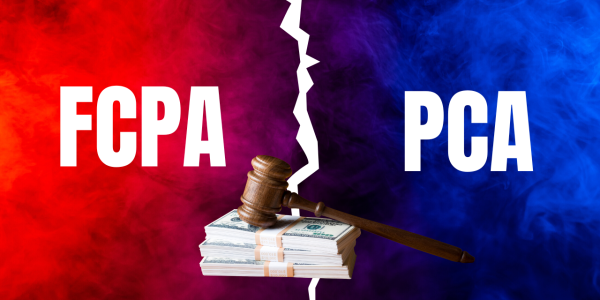Bribery and Corruption
Bribery and corruption are persistent global problems that negatively impact economic development and social welfare. In recent years, the Indian government has taken steps to curb corruption and promote transparency in the business sector. Companies operating in India must adhere to strict laws and regulations to prevent unethical practices.
In this article, we will discuss the best industry practices concerning bribery, corruption, and whistleblowing in Indian companies, focusing on compliance with foreign partners. We will also discuss the role of company Codes of Conduct (CoCs) in combating these practices.Laws and Regulations governing Bribery and Corruption in India
The Prevention of Corruption Act 1988 (including subsequent Amendment) (“PCA”) is India's primary legislation dealing with bribery and corruption. As per the PCA, bribery is the acceptance or offering of any undue advantage to influence the performance of a public servant and corruption is the abuse of entrusted power for personal or private gain. The PCA also covers bribery in the private sector and prohibits companies from indulging in corrupt practices. In addition to the PCA, some other laws and regulations address bribery and corruption in Indian Companies. These include:- The Companies Act, 2013: Section 447 of the Companies Act, 2013 provides for corporate governance and prevention of corruption and fraud in the corporate sector. The term fraud has taken into broader meaning concerning corruption and financial irregularities. The Serious Frauds Investigation Office (SFIO) has been set up under the Ministry of Corporate Affairs, Government of India, which deals with white-collar crimes and offences in companies.
- The Foreign Corrupt Practices Act (FCPA): This Act applies to companies with operations in the United States and is meant to prevent corrupt practices in international business transactions. Indian companies with U.S. based partners and/or shareholders are expected to comply with the FCPA, which prohibits the payment of bribes to foreign officials to obtain or retain business.
- The Bribery Act, 2010 (UKBA): The UKBA applies to companies operating in the United Kingdom and is meant to prevent bribery in both the public and private sectors. Indian companies with foreign partners and /or shareholders in the UK are expected to comply with the Bribery Act, which prohibits the offering, promising, or giving of a bribe.
- An explicit prohibition on the payment of bribes to government officials or intermediaries;
- A commitment to transparency and honesty in business dealings;
- Guidelines on reporting any instances of unethical behaviour, including a confidential and anonymous reporting mechanism;
- An obligation to cooperate with law enforcement agencies in the investigation of corruption cases;
- A system for monitoring and enforcing compliance with the CoC, including employee training and awareness programs.
- Best Industry Practices for Indian Companies with Foreign Partners
- Developing a robust CoC that addresses bribery and corruption and is in line with the laws and regulations of both countries;
- Establishing robust internal controls and processes to prevent and detect corrupt practices, including due diligence procedures for third-party intermediaries;
- Implementing a system for monitoring and enforcing compliance with the CoC, including training and awareness programs for employees;
- Establishing clear policies and procedures for the management of gifts, hospitality, and other expenses, including guidelines on the acceptance of gifts from foreign partners;
- Implementing a confidential and anonymous reporting mechanism for employees to report any instances of unethical behaviour, including bribery and corruption;
- Cooperating with law enforcement agencies to investigate corruption cases and fully disclosing any wrongdoing.
Whistleblowing
Whistleblowing, also known as reporting misconduct or speaking out about wrongdoing, is an essential mechanism for protecting against unethical behaviour in the workplace. It allows employees to raise concerns about unethical or illegal activities without fear of retaliation and helps ensure that companies are held accountable for their actions. In India, the Companies Act 2013 and the SEBI Listing Regulations require listed companies to establish a vigil mechanism or whistleblower policy for employees to report concerns about unethical conduct. The policy must provide for the protection of whistleblowers and ensure that their identities are kept confidential. It should also provide for an independent and impartial review of reported concerns and establish procedures for handling and investigating such reports. In addition to these requirements, there are several best practices that companies (both listed and unlisted) can follow in relation to whistleblowing. These include:-
1) Establishing a clear and easily accessible process for employees to report concerns: Companies should make it easy for employees to report misconduct and provide multiple channels for doing so, such as a dedicated hotline or an online reporting system.
-
2) Protecting the confidentiality of whistleblowers: Companies should ensure that the identity of whistleblowers is kept confidential and that they are not subject to retaliation or discrimination.
-
3)Providing training and awareness on whistleblowing: Companies should educate employees on their rights and responsibilities as whistleblowers and the process for reporting misconduct.
-
4) Conducting timely and impartial investigations: Companies should ensure that reported concerns are thoroughly and impartially investigated and that appropriate action is taken promptly.
-
5) Ensuring the independence of the investigation process: Companies should appoint an independent body or individual to investigate reported concerns to ensure that the process is impartial and unbiased.
6) SEBI has also established a dedicated platform called the SEBI SCORES (SEBI Complaints Redress System) for whistleblowers to report misconduct in listed companies. The SEBI SCORES platform allows whistleblowers to report misconduct anonymously and provides for the confidentiality of the reported information.
- Issues Paper on Corruption and Economic Growth: OECD
- Prevention of Corruption Act, 1988:
- Foreign Corrupt Practices Act
- The World Bank’s Anti-Corruption Guidelines and Sanctions Forum: User Guide
- UN Convention against Corruption
- SEBI (Listing Obligations and Disclosure Requirements), Regulations, 2015 [Last amended on July 25, 2022]











